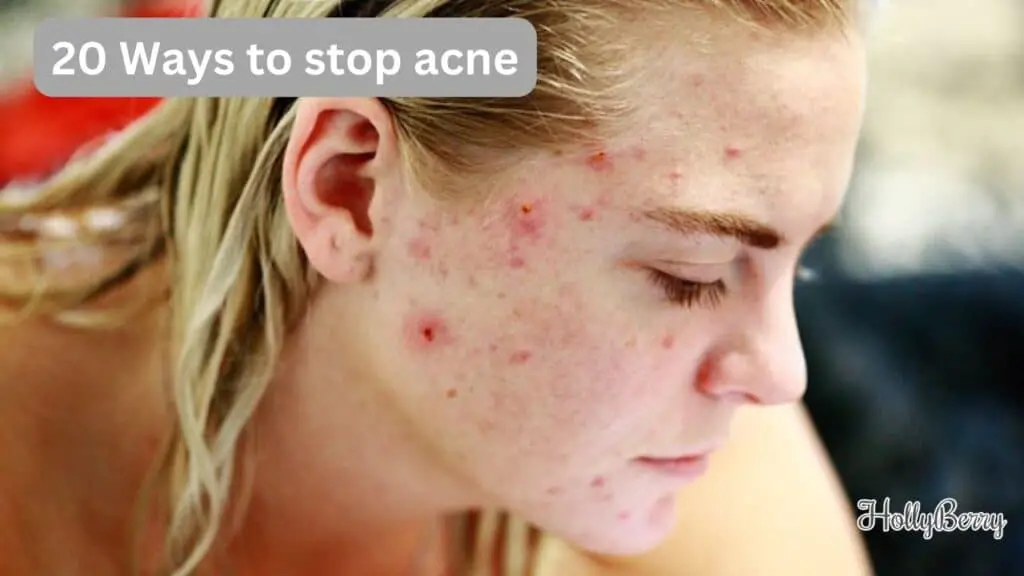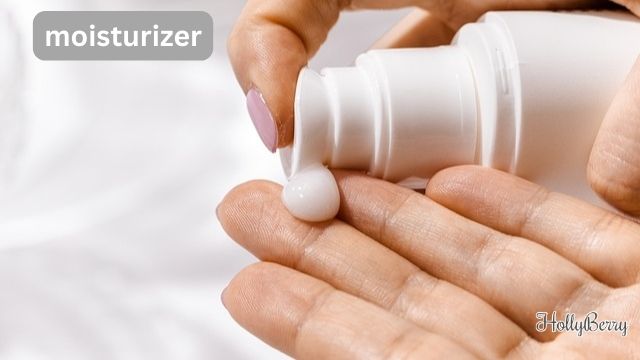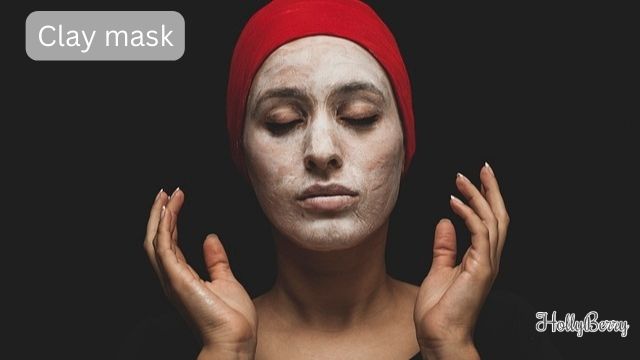
Acne can be a frustrating and persistent problem, but the good news is that there are many things you can do to help prevent and treat it. In this list, we’ll be discussing 20 ways to stop acne, from simple lifestyle changes to specific skincare techniques.
We’ll cover everything from keeping your skin clean and hydrated to avoiding certain foods and hair products, to using specific products like salicylic acid and benzoyl peroxide.
We’ll also talk about the importance of getting plenty of sleep and managing stress, as well as the role of hormones and vitamins in preventing acne. With the right approach, you can achieve clear and healthy skin, so let’s get started!
1 – Keep your face clean by washing it twice a day with a mild cleanser
Hey, one important tip for keeping acne at bay is to make sure you’re keeping your face clean. A great way to do this is by washing your face twice a day with a mild cleanser.
This helps to remove any dirt, oil, and bacteria that may be sitting on the surface of your skin. It’s important to use a mild cleanser so that you don’t dry out your skin or cause any irritation. This routine of twice-a-day cleansing will help to keep your pores clear and reduce the likelihood of breakouts.
2 – Avoid touching your face with your hands, as this can transfer bacteria and oil from your hands to your face
Another important tip for preventing acne is to avoid touching your face with your hands. Your hands come into contact with all sorts of things throughout the day, including bacteria and oils, and if you touch your face, you can transfer all of that to your skin.
This can lead to clogged pores, which in turn can lead to breakouts. So, try to resist the urge to touch your face, especially if you haven’t washed your hands recently. It might take some getting used to, but it can make a big difference in the health of your skin.
3 – Use non-comedogenic (non-pore-clogging) products, such as lotions and makeup
Tip 3 is to be mindful of the products you’re using on your skin. Certain products, like lotions, makeup, and even sunscreens, can contain ingredients that can clog your pores.
This is particularly true for people with oily or acne-prone skin. To avoid this, you should look for products that are labelled as “non-comedogenic” or “non-pore-clogging.” These products are specifically formulated to be less likely to cause breakouts.
So, when you’re shopping for skincare products or makeup, be sure to check the label for those terms. It will help you to keep your skin clear and healthy.
4 – Exfoliate your skin once or twice a week to remove dead skin cells
Exfoliate your skin regularly. Exfoliating helps to remove dead skin cells that can build up on the surface of your skin. These dead skin cells can clog your pores, which can lead to breakouts. By exfoliating, you’re helping to keep your pores unclogged and your skin looking fresh.
It’s important to keep in mind that over-exfoliating can be harsh on the skin and cause irritation, so it’s recommended to exfoliate once or twice a week, depending on your skin type and sensitivity.
You can use a physical exfoliant, like a scrub, or a chemical exfoliant like alpha hydroxy acids (AHAs) or beta hydroxy acids (BHAs) to gently remove the dead skin cells. Be sure to follow up with a moisturizer to keep your skin hydrated.
5 – Use products containing salicylic acid or benzoyl peroxide to help unclog pores
Use products that contain salicylic acid or benzoyl peroxide. These ingredients can be very effective at unclogging pores and preventing breakouts. Salicylic acid is a type of beta hydroxy acid (BHA) that helps to exfoliate the skin, unclog pores and reduce inflammation.
Benzoyl peroxide is an antibacterial agent that helps to kill the bacteria that can cause acne.
You can find these ingredients in different forms like cleansers, toners, spot treatments, and moisturizers. However, you should be careful when using products that contain these ingredients, as they can be drying and irritating to some skin types. It’s a good idea to start with a lower concentration and then gradually increase the strength.
Also, keep in mind that these ingredients can make your skin more sensitive to the sun, so be sure to use sunscreen when you’re using these products.
6 – Apply a moisturizer to help keep your skin hydrated

Be sure you’re keeping your skin hydrated. One way to do this is by using a moisturizer. Moisturizers help to keep your skin from becoming dry and flaky, which can make acne worse.
When you’re choosing a moisturizer, look for one that’s lightweight and non-greasy. Choose a moisturizer that’s formulated for your skin type, whether it be oily, dry, or combination. If you have acne-prone skin, look for a moisturizer labelled as “non-comedogenic” which means it won’t clog your pores.
Use while your skin is still damp, right after cleansing, to seal in the moisture. This will help to keep your skin hydrated and prevent the overproduction of oils which can lead to breakouts.
Also, don’t forget to drink plenty of water to help keep your skin hydrated from the inside out.
7- Apply sunscreen with at least SPF 15 to protect your skin from the sun
Apply sunscreen with at least SPF 15 every day. Sunscreen will help to prevent sunburn, which can be damaging to your skin and can also help to reduce the risk of skin cancer.
When you’re choosing a sunscreen, look for one that’s labelled as “non-comedogenic,” so it won’t clog your pores. Look for a sunscreen that’s formulated for your skin type, whether it be oily, dry, or combination.
Apply sunscreen to all exposed skin, including your face, ears, hands and neck. Apply it at least 15 minutes before going out in the sun and reapply every 2-3 hours if you’re spending a lot of time outdoors or swimming.
Remember, sun protection is important not only during the summertime but all year round, even on cloudy days, because UV rays can penetrate through the clouds.
8 – Avoid using oil-based hair products, as they can contribute to acne on the forehead and temples
keep in mind when preventing acne to be mindful of the hair products you’re using. Some hair products, particularly those that are oil-based, can contribute to acne on the forehead and temples. This is because the oils in these products can transfer onto your skin, clogging your pores and leading to breakouts.
So, when you’re shopping for hair products, look for ones that are labelled as “non-comedogenic” or “non-acnegenic” and avoid those that are oil-based like pomades, serums, and hair oils. Also, keep in mind that you should also avoid using heavy, oily hair products if you have greasy hair, as they can make your hair look even greasier.
Also, keep in mind to keep your hair off your face as much as possible. If you have long hair, you can tie it back or wear it in a ponytail, especially when you’re exercising or sweating. This will help to keep your hair from transferring oils onto your skin, which can contribute to acne.
9 – Avoid using heavy, oily creams and lotions on your face
Don’t use heavy, oily creams and lotions on your face. These types of products can be too rich for your skin and can contribute to clogged pores, which also can lead to breakouts. Instead, opt for lightweight, non-greasy moisturizers that are formulated for your skin type, whether it be oily, dry, or combination.
When you’re applying any product to your face, be sure to use a gentle touch. Avoid rubbing or tugging at your skin, as this can cause irritation and make acne worse. Just gently pat the product onto your skin, and you’ll be on your way to a happy and healthy complexion!
10 – Keep your hair clean, as dirty hair can contribute to acne on the forehead and temples

Hey, do you know what’s important to keep in mind when it comes to preventing acne? Keeping your hair clean! When your hair is dirty, it can contribute to acne on the forehead and temples. That’s because the oils, dirt and product build-up in your hair can transfer to your skin, clogging your pores and causing breakouts.
So, make sure you’re shampooing and conditioning your hair regularly. If you have oily hair, you may need to wash it more frequently.
Also, if you have long hair, you should tie it back or wear it in a ponytail, especially when you’re exercising or sweating. This will help to keep your hair from transferring oils onto your skin, which can contribute to acne.
Also, don’t forget to keep your hairbrush and combs clean, as dirty tools can also transfer bacteria and oils to your scalp. By keeping your hair clean and away from your face, you’ll be one step closer to a clear and happy complexion!
11 – Try to keep your stress level low, as stress can contribute to acne
Stress! It can cause all sorts of problems, including acne. When you’re stressed, your body produces more oil, which can lead to clogged pores and breakouts. Additionally, stress can also make existing acne worse.
So, it’s important to try to keep your stress level low. There are many ways to do this, such as exercise, meditation, yoga, and spending time with friends and family. You might also try journaling, listening to music, or taking a relaxing bath. Find what works best for you and make it a part of your daily routine.
Also, you can try to avoid stress triggers, like a stressful job or difficult relationships, if possible, or learn to manage them in a healthy way.
By keeping your stress level low, you’ll not only feel better, but your skin will also look better.
12 – Avoid eating foods that are high in sugar and fat, as they can contribute to acne
You know what they say, “you are what you eat” and that’s especially true when it comes to your skin. Certain foods can contribute to acne, particularly those that are high in sugar and fat.
Consuming too much sugar can cause a spike in insulin levels, which in turn can lead to an increase in oil production, and clogged pores. Similarly, eating too many foods high in fat can cause the same effect.
So, try to avoid foods that are high in sugar and fat, like fried foods, pastries, and sugary drinks. Instead, focus on eating a diet that’s rich in fruits, vegetables, lean proteins, and whole grains. These foods are packed with vitamins, minerals, and antioxidants that can help to keep your skin healthy.
Also, don’t forget to drink plenty of water, it will help to keep your skin hydrated and flush out toxins that can contribute to acne.
13 – Get plenty of sleep, as a lack of sleep can contribute to acne
What is really important for a healthy body and mind? A good night’s sleep! And you know what else? A good night’s sleep is also important for your skin. When you don’t get enough sleep, your body produces more stress hormones, which can lead to an increase in oil production and clogged pores, resulting in acne.
So, try to get at least 7-8 hours of sleep each night. It’s essential to establish a regular sleep schedule, go to bed and wake up at the same time every day, and create a relaxing bedtime routine.
You should also avoid looking at screens (TV, phone, tablet) for at least an hour before bed, as the blue light from screens can interfere with your body’s production of the sleep hormone melatonin.
Also, avoid eating heavy meals, and drinking caffeine or alcohol close to bedtime, as these can disrupt your sleep.
By getting plenty of sleep, you’ll not only feel better, but your skin will also look better.
14 – Avoid squeezing or picking at your pimples, as this can cause scarring and can make your acne worse
It is really tempting when you have a pimple to squeeze it! But trust me, it’s not worth it, my friend. Squeezing or picking at your pimples can cause scarring and can make your acne worse. When you squeeze or pop a pimple, you’re pushing the bacteria and oils deeper into your skin, which can lead to more inflammation and can create a bigger and more severe breakout.
Instead of squeezing or picking, try using a spot treatment that contains ingredients like salicylic acid or benzoyl peroxide, which can help to reduce inflammation and unclog pores. Also, try to keep your hands off your face as much as possible, to avoid transferring bacteria and oils onto your skin.
If you have stubborn pimples that won’t go away, consider seeing a dermatologist for professional treatment. By avoiding squeezing or picking, you’ll not only avoid scarring but also prevent your acne from getting worse.
15 – Try using tea tree oil as a spot treatment for acne
Ever heard of using tea tree oil as a spot treatment for acne? It’s a great natural alternative to harsh chemicals. Tea tree oil is known for its anti-inflammatory and antimicrobial properties, which can help to reduce the redness and inflammation caused by acne, and also kills the bacteria that can cause breakouts.
You can apply a small amount of tea tree oil directly to the affected area using a cotton swab or you can add a few drops to your moisturizer or face wash. Just make sure to use a carrier oil, like jojoba oil, to dilute the tea tree oil, as it can be harsh on the skin when used undiluted.
It’s important to be mindful of the concentration of tea tree oil you’re using, as high concentrations can cause irritation in some people. Also, it’s best to do a patch test before applying it all over the face.
Give it a try and see if it works for you, you’ll be surprised by the results! And the smell.
16 – Use a toner to restore the pH balance of your skin after cleansing
Do you know what’s an often-overlooked step in a skincare routine, that can make a big difference in preventing acne? Using a toner! Toner can help to restore the pH balance of your skin after cleansing.
Cleansers can disrupt the skin’s natural pH balance, which can lead to dryness, irritation, and even more breakouts. A toner helps to neutralize the pH of the skin and also can help to remove any remaining traces of dirt, oil, and makeup.
You can use a toner that’s formulated for your skin type, whether it be oily, dry, or combination. You can use it after cleansing, by applying it to a cotton pad and gently wiping your face. You can also use a toner that contains ingredients like salicylic acid or witch hazel, as they can help to unclog pores and reduce inflammation.
Don’t forget to also moisturize after using a toner, as it can leave your skin feeling tight and dry. Adding a toner to your routine can make a big difference in keeping your skin clear and healthy. Give it a try and see the difference!
17 – Take vitamins like zinc, Vitamin A and E, which are known to have a beneficial effect on the skin

Certain vitamins like zinc, Vitamin A, and E have been known to have a beneficial effect on the skin, especially when it comes to preventing and treating acne.
Zinc, for example, can help to reduce inflammation and regulate oil production. Vitamin A can help to unclog pores and reduce the appearance of acne scars. Vitamin E is an antioxidant that can help to protect the skin from free radical damage, which can lead to premature aging and acne.
You can take these vitamins as supplements, but it’s always better to consult with a doctor or a nutritionist before starting any new supplement regimen.
They can also be found in certain foods like nuts, seeds, and leafy greens. Keep in mind that vitamins alone won’t solve your acne problems, but they can be a great addition to your skincare routine when combined with a healthy diet and lifestyle.
18 – Get your hormones checked, if you experience acne during certain times of the month
hormonal changes can cause an increase in oil production, which can lead to clogged pores and breakouts. If you find that you’re experiencing acne during certain times of the month, like before or during your period, it’s worth getting your hormones checked.
Certain hormonal imbalances, like polycystic ovary syndrome (PCOS) or hormonal acne, can cause chronic and persistent breakouts. A doctor or a dermatologist can help you to identify the underlying cause and suggest the appropriate treatment.
Treatment options can include birth control pills, which can help to regulate hormone levels, or topical medications like retinoids or spironolactone, which can help to reduce oil production and unclog pores.
Don’t suffer in silence, take control of your skin and talk to a professional. It’s important to address the underlying cause, in order to effectively manage and prevent acne.
19 – Try using a clay mask to help draw impurities out of the skin

Use a clay mask to help with your acne. They are a great way to draw impurities out of the skin and leave it feeling fresh and clean. Clay masks contain natural minerals that can help to absorb excess oil and unclog pores, which can reduce the appearance of acne.
There are different types of clay masks available, such as green clay, pink clay, and white clay, each one with specific benefits. Green clay, for example, is great for oily and acne-prone skin as it’s highly absorbent and can help to remove impurities and toxins from the skin.
Pink clay is great for sensitive skin as it’s gentle and can help to soothe inflammation. White clay is great for all skin types and can help to brighten and exfoliate the skin.
When using a clay mask, apply a thin layer to your face and let it sit for 10-15 minutes. Then, rinse it off with warm water and follow up with a moisturizer. You can use a clay mask once or twice a week, depending on your skin type. Give it a try and see the difference it can make!
20 – Consider seeing a dermatologist if your acne persists despite your best efforts
If you’re struggling with acne and have tried everything but haven’t seen any improvement, it might be time to consider seeing a dermatologist. A dermatologist is a medical professional who specializes in the diagnosis and treatment of skin conditions, including acne.
They can help you to identify the underlying cause of your acne and develop a personalized treatment plan that’s tailored to your specific needs.
During the visit, the dermatologist will examine your skin and ask you questions about your skincare routine, diet, and overall health. They may also conduct a skin test to identify any underlying conditions that may be contributing to your acne.
Treatment options can include medications, such as topical creams and oral antibiotics, as well as light therapy, chemical peels and other procedures.
Don’t let acne control your life, don’t hesitate to seek professional help. A dermatologist can help you to achieve clear and healthy skin, and provide you with the tools and knowledge you need to keep it that way.
I hope this has helped you in finding the right treatment for acne. Bye for now 😊


